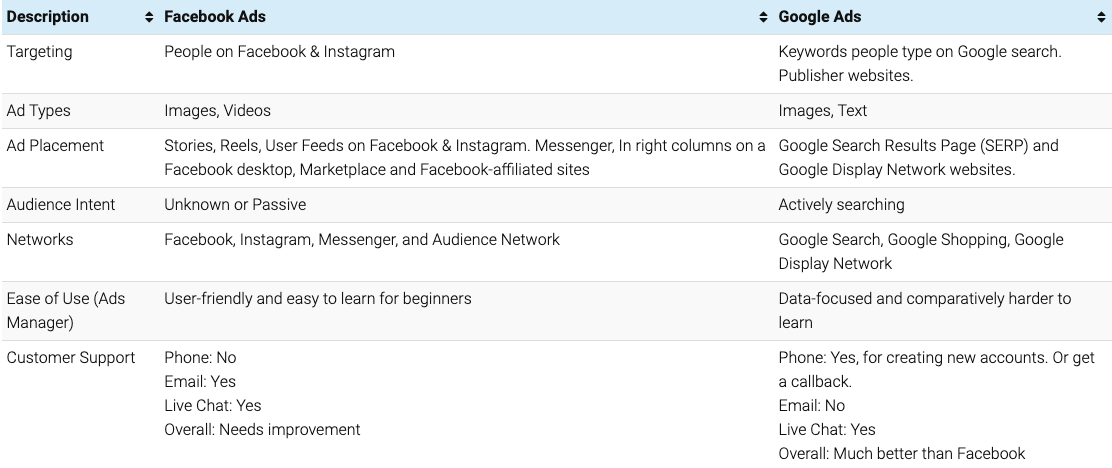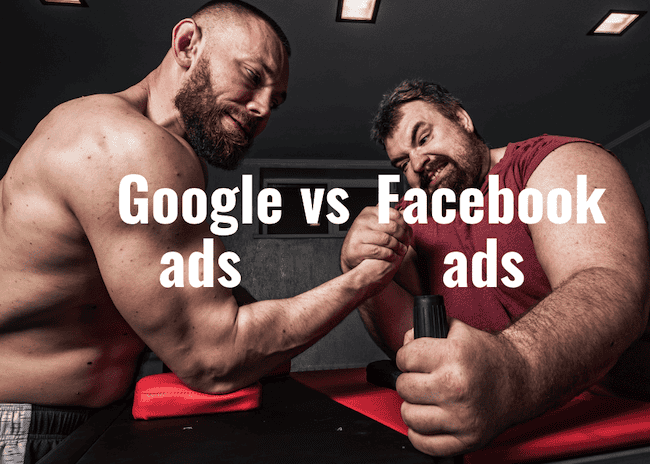It is a million-dollar, nay, billion-dollar question: which is better between Facebook ads and Google ads? The answer is complicated and depends on the goal of your advertising campaign and many contextual factors. However, if your advertising goals are clear, it is comparatively simple to know which is better or if you need a combination of both.
Facebook and Google are the world’s leading digital advertising platforms. According to Statista, a whopping 233 billion dollars are forecasted to be spent on digital ads in the U.S. in 2022. For scale, Greece’s total GDP in 2021 was 216.24 billion dollars. The majority of these advertising dollars will go to Facebook and Google. The number dropping here is intentional to draw your attention to the significance of these platforms for any advertising and marketing strategy.
 Digital advertising spending worldwide (2007-2024)
Digital advertising spending worldwide (2007-2024)
Broadly speaking, marketers use Google ads to target people actively searching for products/services on search engines (also known as the Low funnel). On the other hand, brands prefer Facebook ads to find people with a high probability of interest in their product/service offering but who are not actively searching for it (High funnel).
Note: In the context of this article, Facebook ads mean ads on Facebook and Instagram.
How Facebook ads stack against Google ads
The table below summarizes the key business critical indicators for both Google and Facebook ads.

Notes:
- All costs are stated in U.S. dollars.
- The above KPIs are for generic benchmarking.
- These metrics vary across industries and countries.
When to use Google Ads v/s Facebook Ads
Facebook ads are better for higher funnel marketing objectives like creating brand awareness because the audience on Facebook is not actively looking to buy anything, at least not while they’re on Facebook. They’re simply browsing, and your ad *might* happen to catch their attention and prompt them to learn more. Google ads are well suited for lower-funnel marketing goals like lead generation because the user is actively searching with the intent to act.
Use Case for Google Ads:
All businesses need more sales, which makes it easier for marketers to use Google ads when they’re hot on the heels of chasing conversions. Google ads work better for brands whose products/services people are actively searching for, like a plumbing company or a hair salon.
People search for everything under the sun on Google, but that doesn’t imply Google ads are your best bet. For example, if you were a new startup selling AI-powered auto-tracking phone mounts like Obsbot, it wouldn’t make sense to use Google ads initially because no one is searching for “auto-tracking Phone mounts”. Don’t believe us? See the screenshot from SEMRush for this keyword:
![]()
SEMRush screenshot for the Keyword “auto-tracking phone mounts”
Use Case for Facebook Ads:
Businesses that need more eyeballs and to create awareness about their product/service should use Facebook ads. The best part about Facebook ads is the network’s ability to show your brand to an audience who has never heard about it before. Facebook is a visual platform that gives marketers a lot of creative space to showcase their brand and create curiosity. Google search ads, in comparison, are mostly text ads and are not best suited for brand discovery.
For a new brand like Obsbot, using Facebook ads to reach new audiences and create brand awareness is the right strategy. This is what they are doing right now. Here is a screenshot of their campaign on Instagram:

Obsbot Brand Awareness Campaign on Instagram
Once people start to search on Google/Bing about “auto-tracking phone mounts,” it would make sense for Obsbot to use Google ads to target customers who are looking to buy auto-tracking mounts. Until then, it is better for them to create awareness about their product using Facebook ads.
Google Ads vs Facebook Ads: Platform Capabilities

Conclusion
Both Google and Facebook ads are excellent marketing tools that can elevate your brand and impact your bottom line. The dilemma of selecting between Facebook and Google ads depends on the nature and stage of your business and your marketing objectives. If immediate sales and conversions are required, then Google ads are better suited.
Facebook ads are great for increasing brand awareness and establishing your brand in the consumer’s consideration set. At times, a mix of both is recommended, especially for niche businesses that are just starting out.
If all of this is too complicated an ask and you’d rather focus on improving your product/service, reach out to a marketing agency like ours and let us help you figure out your optimal digital marketing mix.
Photo credit: Alexa Popovich on Pexels, Obsbot & Statista.
You can also download our handy Infographic, which succinctly explains Facebook ads vs. Google ads—which is Better for Your Business.

References:
https://www.macrotrends.net/countries/GRC/greece/gdp-gross-domestic-product
https://www.statista.com/statistics/276671/global-internet-advertising-expenditure-by-type/
https://revealbot.com/facebook-advertising-costs
https://www.wordstream.com/blog/ws/2019/08/19/conversion-rate-benchmarks
https://adespresso.com/blog/6-factors-that-drive-up-the-cost-of-your-facebook-ads-conversions/
https://www.wordstream.com/blog/ws/2021/07/12/facebook-ads-cost
https://www.wordstream.com/blog/ws/2016/02/29/google-adwords-industry-benchmarks
https://www.channelsight.com/blog/roas
